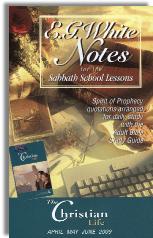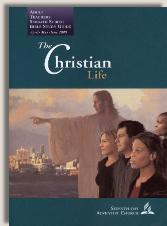|
||||||||||||||
Commentary on "Life"
Day 5: Wednesday, April 22, 2009
Social Life
We live our lives on many social levels which include such things as; marriage, family, friendship, employment, community and Christian fellowship. Nobody, no matter how isolated they may be, conducts their lives without some form of interaction and cooperation with others. The Bible has much to say on how we are to relate and interact with others.
Problems
For the most part, the points being made in this lesson are good. However, this would be an appropriate time to cover several things that has been overlooked or simply have not been fully developed.
First, let's look at the following passage, where the Scribe asks Jesus which is the greatest or most important command:
And thou shalt love the Lord thy God with all thy heart, and with all thy soul, and with all thy mind, and with all thy strength: this is the first commandment. And the second is like, namely this, Thou shalt love thy neighbour as thyself. There is none other commandment greater than these (Mark 12:30,31 KJV).
Now, notice how Jesus responds to the Scribe in the next passage:
And the scribe said unto him, Well, Master, thou hast said the truth: for there is one God; and there is none other but he: And to love him with all the heart, and with all the understanding, and with all the soul, and with all the strength, and to love his neighbour as himself, is more than all whole burnt offerings and sacrifices. And when Jesus saw that he answered discreetly, he said unto him, Thou art not far from the kingdom of God. And no man after that durst ask him any question (Mark 12:32-34 KJV).
The scribe was very close but not quite in the kingdom of God. He understood these two commands, yet there was something missing in his life. We have already learned in yesterday's lesson what this was. We know that what he lacked was the need to be 'born again' . With a living and regenerated spirit, he could enter the kingdom of God.
As for the apparent concern, in this lesson, about wanting to know why Adventist's loose their non-Adventist friends over a period a time, a better question would be to ask why Adventist shun non-Adventist friendships, even though many people they know obviously love the Lord but simply worship in other fellowships? And, why do Adventist make a point of not wanting to know why so many former Adventist have done nothing more than reject the unique Adventist teachings that they now understand to be unscriptural?
Our loyalty to Jesus Christ should be paramount and translate into a desire to lead others into the kingdom of God. The outworking of our social relationships should reflect this desire and have nothing to do with the denomination we join for fellowship.
Summary
- A well balanced and healthy social life should be founded upon the 'two greatest commands'.
- Our love for God and love others should be the foundation undergirding our motives and behavior in all our social relationships.
Copyright 2008 BibleStudiesForAdventists.com. All rights reserved. Revised April 11, 2009. This website is published by Life Assurance Ministries, Glendale, Arizona, USA, the publisher of Proclamation! Magazine. Contact email: BibleStudiesForAdventists@gmail.com.
The Sabbath School Bible Study Guide and the corresponding E.G. White Notes are published by Pacific Press Publishing Association, which is owned and operated by the Seventh-day Adventist church. The current quarter's editions are pictured above.
Official Adventist Resources
Standard Edition Study Guide Week 4
Teacher's Edition Study Guide Week 4
Easy Reading Edition Study Guide Week 4
Search the Complete Published Ellen G. White Writings


